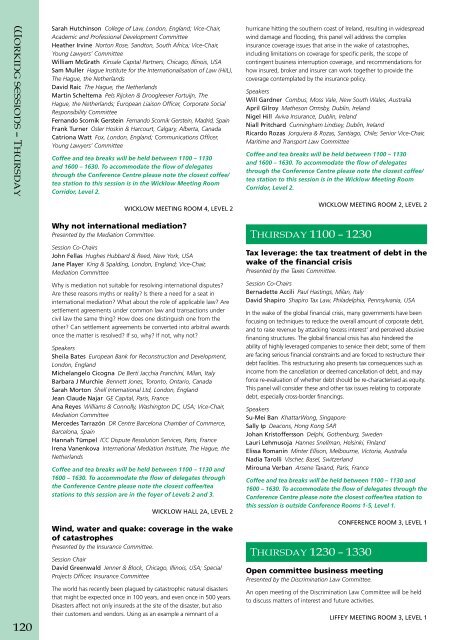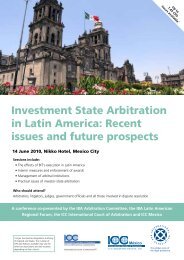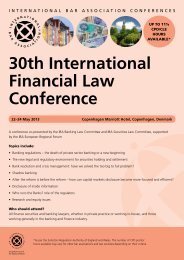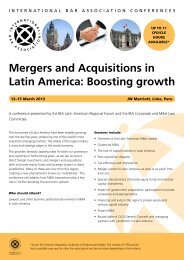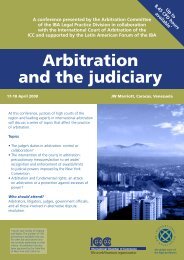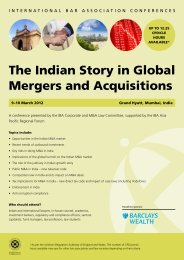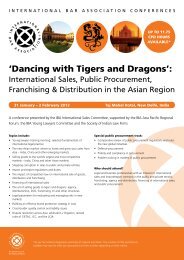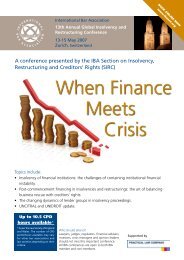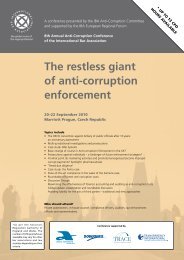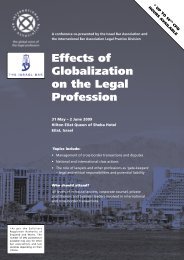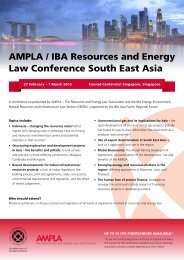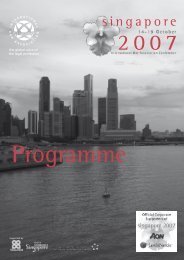Final Programme - International Bar Association
Final Programme - International Bar Association
Final Programme - International Bar Association
Create successful ePaper yourself
Turn your PDF publications into a flip-book with our unique Google optimized e-Paper software.
Working sessions – Thursday<br />
120<br />
Sarah Hutchinson College of Law, London, England; Vice-Chair,<br />
Academic and Professional Development Committee<br />
Heather Irvine Norton Rose, Sandton, South Africa; Vice-Chair,<br />
Young Lawyers’ Committee<br />
William McGrath Kinsale Capital Partners, Chicago, Illinois, USA<br />
Sam Muller Hague Institute for the <strong>International</strong>isation of Law (HiiL),<br />
The Hague, the Netherlands<br />
David Raic The Hague, the Netherlands<br />
Martin Scheltema Pels Rijcken & Droogleever Fortuijn, The<br />
Hague, the Netherlands; European Liaison Officer, Corporate Social<br />
Responsibility Committee<br />
Fernando Scornik Gerstein Fernando Scornik Gerstein, Madrid, Spain<br />
Frank Turner Osler Hoskin & Harcourt, Calgary, Alberta, Canada<br />
Catriona Watt Fox, London, England; Communications Officer,<br />
Young Lawyers’ Committee<br />
Coffee and tea breaks will be held between 1100 – 1130<br />
and 1600 – 1630. To accommodate the flow of delegates<br />
through the Conference Centre please note the closest coffee/<br />
tea station to this session is in the Wicklow Meeting Room<br />
Corridor, Level 2.<br />
WICKLOW MEETING ROOM 4, LEVEL 2<br />
Why not international mediation?<br />
Presented by the Mediation Committee.<br />
Session Co-Chairs<br />
John Fellas Hughes Hubbard & Reed, New York, USA<br />
Jane Player King & Spalding, London, England; Vice-Chair,<br />
Mediation Committee<br />
Why is mediation not suitable for resolving international disputes?<br />
Are these reasons myths or reality? Is there a need for a seat in<br />
international mediation? What about the role of applicable law? Are<br />
settlement agreements under common law and transactions under<br />
civil law the same thing? How does one distinguish one from the<br />
other? Can settlement agreements be converted into arbitral awards<br />
once the matter is resolved? If so, why? If not, why not?<br />
Speakers<br />
Sheila Bates European Bank for Reconstruction and Development,<br />
London, England<br />
Michelangelo Cicogna De Berti Jacchia Franchini, Milan, Italy<br />
<strong>Bar</strong>bara J Murchie Bennett Jones, Toronto, Ontario, Canada<br />
Sarah Morton Shell <strong>International</strong> Ltd, London, England<br />
Jean Claude Najar GE Capital, Paris, France<br />
Ana Reyes Williams & Connolly, Washington DC, USA; Vice-Chair,<br />
Mediation Committee<br />
Mercedes Tarrazón DR Centre <strong>Bar</strong>celona Chamber of Commerce,<br />
<strong>Bar</strong>celona, Spain<br />
Hannah Tümpel ICC Dispute Resolution Services, Paris, France<br />
Irena Vanenkova <strong>International</strong> Mediation Institute, The Hague, the<br />
Netherlands<br />
Coffee and tea breaks will be held between 1100 – 1130 and<br />
1600 – 1630. To accommodate the flow of delegates through<br />
the Conference Centre please note the closest coffee/tea<br />
stations to this session are in the foyer of Levels 2 and 3.<br />
WICKLOW HALL 2A, LEVEL 2<br />
Wind, water and quake: coverage in the wake<br />
of catastrophes<br />
Presented by the Insurance Committee.<br />
Session Chair<br />
David Greenwald Jenner & Block, Chicago, Illinois, USA; Special<br />
Projects Officer, Insurance Committee<br />
The world has recently been plagued by catastrophic natural disasters<br />
that might be expected once in 100 years, and even once in 500 years.<br />
Disasters affect not only insureds at the site of the disaster, but also<br />
their customers and vendors. Using as an example a remnant of a<br />
hurricane hitting the southern coast of Ireland, resulting in widespread<br />
wind damage and flooding, this panel will address the complex<br />
insurance coverage issues that arise in the wake of catastrophes,<br />
including limitations on coverage for specific perils, the scope of<br />
contingent business interruption coverage, and recommendations for<br />
how insured, broker and insurer can work together to provide the<br />
coverage contemplated by the insurance policy.<br />
Speakers<br />
Will Gardner Combus, Moss Vale, New South Wales, Australia<br />
April Gilroy Matheson Ormsby, Dublin, Ireland<br />
Nigel Hill Aviva Insurance, Dublin, Ireland<br />
Niall Pritchard Cunningham Lindsey, Dublin, Ireland<br />
Ricardo Rozas Jorquiera & Rozas, Santiago, Chile; Senior Vice-Chair,<br />
Maritime and Transport Law Committee<br />
Coffee and tea breaks will be held between 1100 – 1130<br />
and 1600 – 1630. To accommodate the flow of delegates<br />
through the Conference Centre please note the closest coffee/<br />
tea station to this session is in the Wicklow Meeting Room<br />
Corridor, Level 2.<br />
Thursday 1100 – 1230<br />
WICKLOW MEETING ROOM 2, LEVEL 2<br />
Tax leverage: the tax treatment of debt in the<br />
wake of the financial crisis<br />
Presented by the Taxes Committee.<br />
Session Co-Chairs<br />
Bernadette Accili Paul Hastings, Milan, Italy<br />
David Shapiro Shapiro Tax Law, Philadelphia, Pennsylvania, USA<br />
In the wake of the global financial crisis, many governments have been<br />
focusing on techniques to reduce the overall amount of corporate debt,<br />
and to raise revenue by attacking ‘excess interest’ and perceived abusive<br />
financing structures. The global financial crisis has also hindered the<br />
ability of highly leveraged companies to service their debt; some of them<br />
are facing serious financial constraints and are forced to restructure their<br />
debt facilities. This restructuring also presents tax consequences such as<br />
income from the cancellation or deemed cancellation of debt, and may<br />
force re-evaluation of whether debt should be re-characterised as equity.<br />
This panel will consider these and other tax issues relating to corporate<br />
debt, especially cross-border financings.<br />
Speakers<br />
Su-Mei Ban KhattarWong, Singapore<br />
Sally Ip Deacons, Hong Kong SAR<br />
Johan Kristoffersson Delphi, Gothenburg, Sweden<br />
Lauri Lehmusoja Hannes Snellman, Helsinki, FInland<br />
Elissa Romanin Minter Ellison, Melbourne, Victoria, Australia<br />
Nadia Tarolli Vischer, Basel, Switzerland<br />
Mirouna Verban Arsene Taxand, Paris, France<br />
Coffee and tea breaks will be held between 1100 – 1130 and<br />
1600 – 1630. To accommodate the flow of delegates through the<br />
Conference Centre please note the closest coffee/tea station to<br />
this session is outside Conference Rooms 1-5, Level 1.<br />
Thursday 1230 – 1330<br />
CONFERENCE ROOM 3, LEVEL 1<br />
Open committee business meeting<br />
Presented by the Discrimination Law Committee.<br />
An open meeting of the Discrimination Law Committee will be held<br />
to discuss matters of interest and future activities.<br />
LIFFEY MEETING ROOM 3, LEVEL 1


